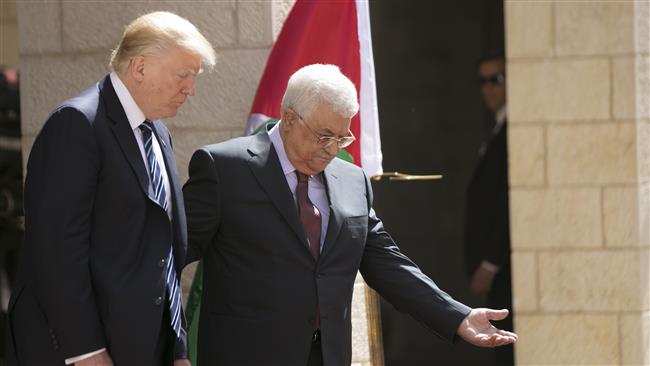
RNA - In a phone call on Tuesday, Trump "informed the president (Abbas) on his intention to move the US embassy from Tel Aviv to Jerusalem," the Palestinian presidency said in a statement.
The statement did not explain whether the US president planned to move the embassy immediately or at some point in the future.
Abbas, for his part, "warned of the dangerous consequences of such a decision on the peace process, security and stability in the region and the world," the statement said.
"The president reaffirms our firm position that there can be no Palestinian state without east Jerusalem as its capital in accordance with the resolutions of international law and the Arab peace initiative," it added.
The Palestinian president "will continue his communications with world leaders to prevent such an unacceptable and rejected step."
Earlier in the day, Abbas’ diplomatic adviser Majdi Khaldi said the Palestinian leadership would “stop contacts” with Washington if Trump declared the recognition.
On Monday, White House spokesman Hogan Gidley said that Trump "has been clear on this issue from the get-go: It is not a matter of if, it is a matter of when."
Trump’s expected declaration of Jerusalem al-Quds as Israel’s “capital” has drawn opposition from various countries and international bodies, including Turkey and the European Union (EU).
The EU foreign policy chief, Federica Mogherini, said earlier in the day that “any action that would undermine” the two-state solution “must absolutely be avoided.”
Mogherini was speaking alongside US Secretary of State Rex Tillerson on a visit to Brussels.
She said EU foreign ministers will jointly discuss the status of Jerusalem al-Quds with Israeli Prime Minister Benjamin Netanyahu in Brussels next Monday, to be followed by a similar meeting with Abbas early next year.
The entire Jerusalem al-Quds is currently under Israel’s control, while the regime also claims the city’s eastern part, which hosts the third holiest Muslim site.
The city has been designated as “occupied” under international law since the 1967 Arab War, which Palestinians want as the capital of their future state.
Since the US Congress ruled in 1995 that the embassy be relocated from Tel Aviv, every president has deferred the troublesome measure by issuing a six-month waiver.
When Trump faced his first deadline back in June, he also refused to keep his campaign pledge to immediately move the embassy.
According to The Washington Post, “he acted, reluctantly, on advice from Cabinet heads, Jordanian King Abdullah II and others, who argued that such a move could ignite violence.”
Trump’s emerging administration was also starting stated efforts to restart Mideast peace talks, which could be potentially harmed by the move.
Trump, however, has harmed his agenda by other measures that have alienated Palestinians even further as his Jewish son-in-law Jared Kushner stays in charge of the so-called peace process between Israel and Palestinians.
847/940